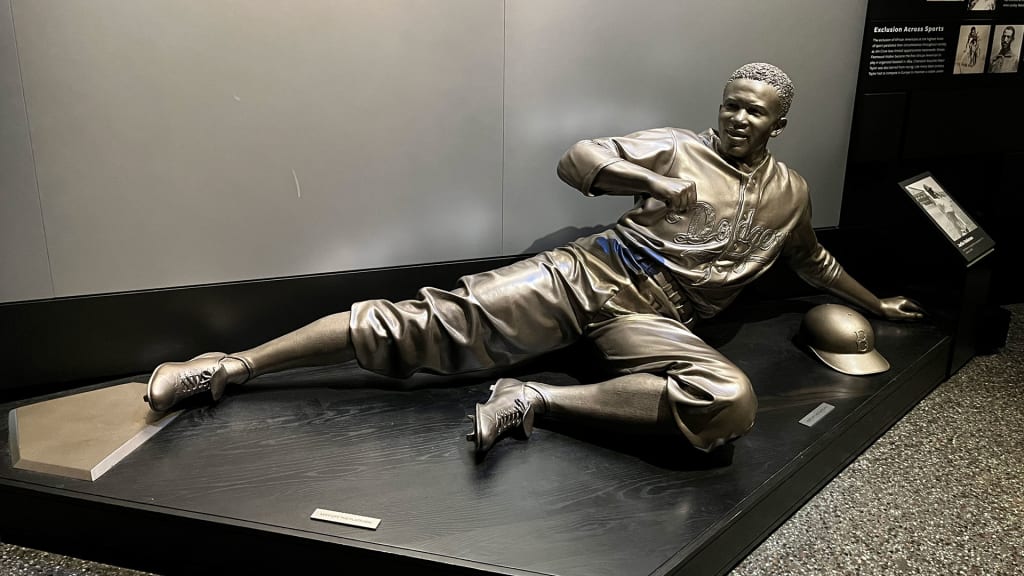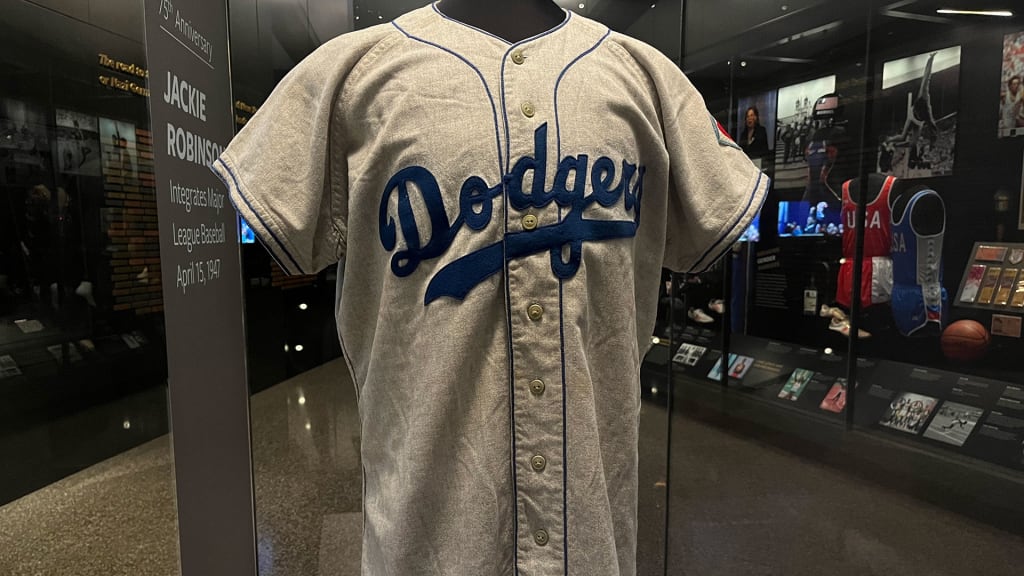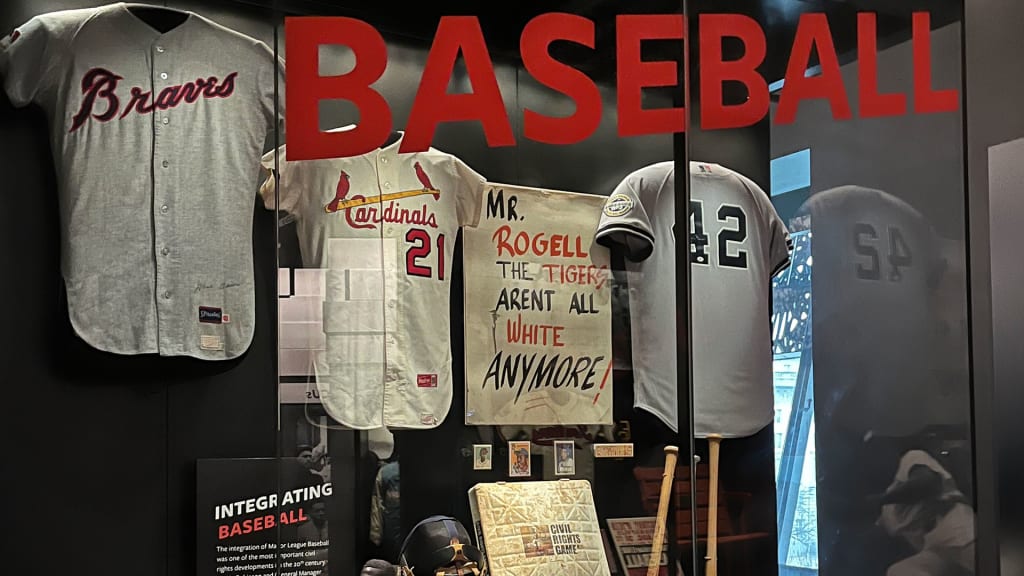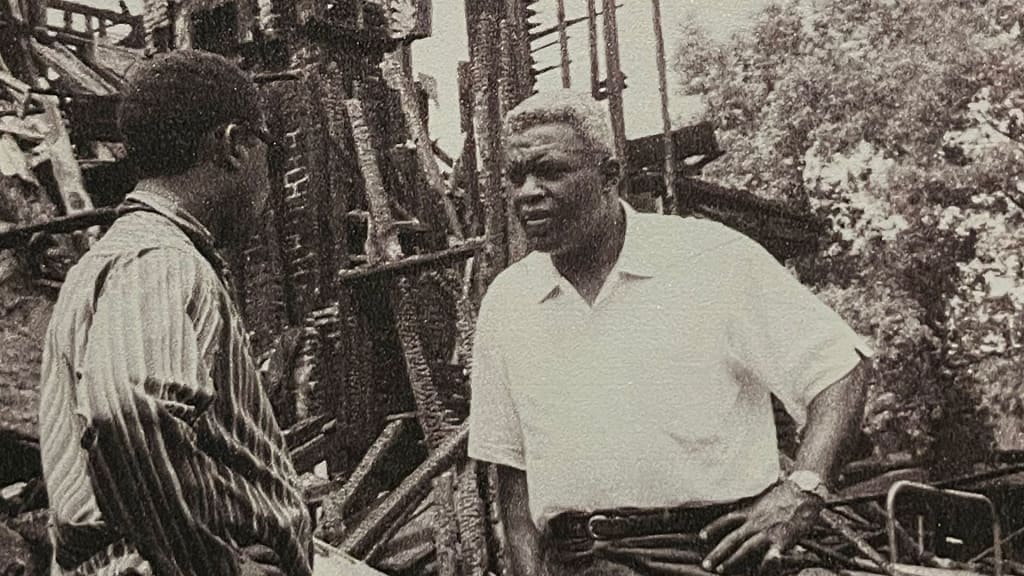
WASHINGTON -- As Major League Baseball gears up to honor Jackie Robinson on the 75th anniversary of his color-barrier-breaking debut with the Brooklyn Dodgers on April 15, 1947, one beacon of African American history is honoring the trailblazing Hall of Famer in its own way.
For the month of April, the National Museum of African American History and Culture will display Robinson’s jersey in a gallery within the third floor “Sports: Leveling the Playing Field” exhibit. The jersey, on loan from a private collection, is one of an estimated five remaining game-worn Robinson jerseys. A beautifully preserved artifact, the jersey is from the 1951 season, the classic road gray fabric with Dodger blue lettering and numbers.
Along with the temporary installation housing the jersey, part of the museum’s permanent collection includes a life-size statue of Robinson and a section on Robinson and his contributions to sports and the Black community, which features another Robinson jersey and a game-used bat. There is also a section on African Americans in baseball, featuring a Hank Aaron jersey.

For the museum, which highlights the historical and cultural impact the Black community has had on the United States, Robinson embodied the hopes and dreams of African Americans and served as a symbol for all that could be accomplished once the door was opened and Black Americans were given the opportunity to compete on equal terms -- in any field, not just sports.
“Robinson had a tremendous burden on him,” sports curator Damion Thomas said. “Every game he played was scrutinized; every opportunity he took to compete was watched. You couldn't go anywhere in 1947 in Black America and not hear the question, ‘How did Jackie do today?’ Because people knew that Jackie Robinson’s success or failure would be used as a way to create or to deny opportunities for African Americans.”

Robinson’s impact on baseball extended beyond race. He was a person who never stopped pushing for advancement, whether a better product on the field or better rights nationwide. A former track athlete, Robinson helped bring baserunning, one of the key elements of the Negro Leagues, back to the forefront of Major League Baseball. And Robinson’s impact on fans was clear -- everywhere the Dodgers played (except in Cincinnati) the team set attendance records, according to Thomas.
“He continued, throughout the end of his life, to ask baseball and society to do more,” Thomas said. “At the 25th anniversary of him integrating baseball, just less than two weeks before he passed away, baseball invited him to participate in the World Series. Jackie Robinson’s message [in response] was that there are no African American managers, and we have to correct that.
“He was always somebody who was committed to doing more rather than just thinking about what he had accomplished in the past.”
The first Black player inducted into the Baseball Hall of Fame, Robinson was actively involved in the civil rights movement and was close friends with Martin Luther King Jr. He attended the March on Washington, standing on the steps of the Lincoln Memorial with his children looking on as King gave his famous speech, and Robinson participated in efforts to rebuild a series of Black churches that had been burned as acts of intimidation.

King once said, “Back in the days when integration wasn’t fashionable, [Robinson] underwent the trauma and the humiliation and the loneliness which comes with being a pilgrim walking the lonesome byways toward the high road of Freedom. He was a sit-inner before the sit-ins, a freedom rider before the Freedom Rides.”
That quote perfectly embodies the significance of Robinson to Black America and to U.S. society. He was one of those Black athletes whose participation in the early parts of the civil rights movement paved the way for those larger changes that were fought for, and won, in the 1960s. Robinson was an athlete who saw not only his opportunity to bring about change on the playing field, but he was also actively involved in the larger, wider struggles; his success far transcended the baseball field.
“I think the best way that we can honor Jackie Robinson and his legacy is to find our own ways to support social justice and equality,” Thomas said. “Figure out how we can make a contribution. Now we all can’t do what Robinson did or have as big an impact, but we can all be committed to ensuring that society is a place where people have an opportunity to rise as far as their talent, their ambition and their skills can take them.”
